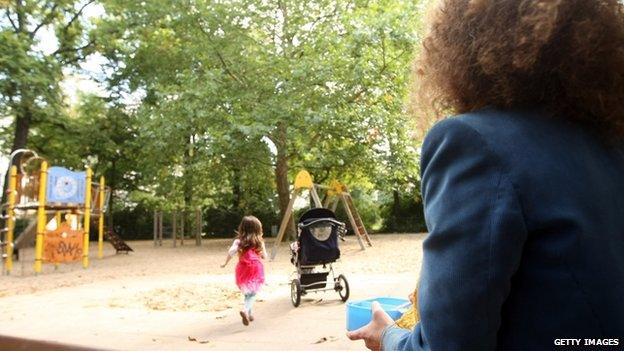Women 'find it harder to work' in London, says GLA report
- Published

GLA Economics found 60% of women with children, who are eligible to work, have a job in London
Women are finding it harder to work in London than the rest of the country because of the costs of transport and childcare, according to a report.
Cuts in benefits and tax credits since the financial crisis are further reasons cited by the GLA (Greater London Authority) Economics study., external
It finds 60% of women with children, who are eligible to work, have a job in London.
That compares with just under 70% across the country, the report says.
The Mayor of London's office said it was "working to increase the number of flexible and good quality paid jobs for women".
Since 2008, part-time jobs in the capital have increased by nearly a quarter - to 1.6 million - compared to a 9% increase in the UK.
However, women are not getting the same access to work as elsewhere, the Part-time employment in London report, external said.
It said the costs of transport and childcare are barriers to women returning to work, with childcare costs in London 28% higher than the British average, according to the Daycare Trust.

childcare costs in London are 28% higher than the British average according to the Daycare Trust.
Because 34% of people use public transport in London, both the time it takes to travel and the price of fares reduce the incentive to get part-time work, GLA Economics said.
"The costs of travelling to work are likely to be higher in London than elsewhere in the UK," it says.
"The choice of whether to work part-time needs to factor in higher opportunity costs for working as compared to those working full-time.
"Longer journey times mean subtracting time from other important activities such as childcare, and because this is more expensive in London, it may well not pay for some to take a part-time job."
But another major factor is that the tax and benefit system does not compensate for London's higher cost of living, according to the report.
'Better deal' needed
It says the coalition government's abolition of the In Work Credit allowance removed one way of giving eligible Londoners a premium to offset higher living costs.
"Other changes to the welfare system, affecting couples with children in particular, have occurred and are likely to continue to occur in the future (e.g. Universal Credit).
"If these policy changes do not take into account London's circumstances, the relative disincentive to take work in London (as compared to the rest of the country) could remain or become higher still."
Karen Buck, Labour MP for Westminster North, said the high cost of living in the capital had been exacerbated by low pay.
Recent research by the Trades Union Congress (TUC) suggested in six boroughs - Bexley, Newham, Merton, Harrow, Redbridge and Waltham Forest - the majority of female part-time workers earn less than the London living wage of £8.80 an hour.
"London needs a better deal on childcare, improvements in the minimum wage and faster progress towards the Living Wage," Ms Buck said.
A Mayor of London spokesman said: "The Mayor is looking at ways to work with employers to improve and increase the number of flexible and good quality paid jobs for women, particularly those with childcare responsibilities.
"He has introduced a part-time Travelcard with Transport for London and plans to commission employment programmes focused on supporting parents who are out of work or in low paid work to access good quality sustainable jobs."
- Published17 January 2015
- Published22 January 2015

- Published25 January 2015